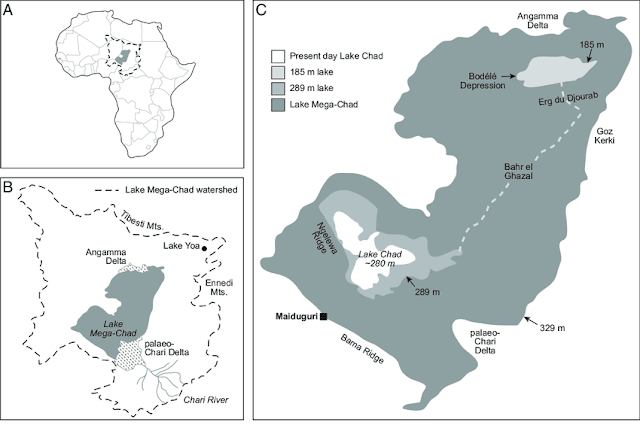Agriculture I - the fall of fishing
This blog post is going to be the first of three parts focussing on agriculture in the Lake Chad region. In this post I am going to focus on fishing and how it has changed in recent decades.
In a 2007 BBC new article, Jacob Nyanganji of the University of Maiduguri suggested that ‘Africa is being cheated again by the industrialised West’ (Murray 2007). Nyanganji suggests that Africa is bearing the brunt of aridification as a result of climate change, while it is the West which is producing the most significant quantities of greenhouse gases. The rate at which Lake Chad is shrinking has had significant consequences for local fishing communities and one former fishermen, described the local population as 'dying with the lake' (Murray 2007).
Past decades
A large part of investigating how environmental change has affected fishing in the region is done through speaking to elderly villagers. Older generations can often remember when the waters of Lake Chad were far more extensive and fish catches were plentiful (Okpara et al. 2016).
The Lake Chad basin is thought to support 20 million people including over 150,000 fishermen (Gawler 2018). A 2011 FAO report on the relationship between climate change and fishing in the Lake Chad Basin found that catches had reduced by over half from 1974 to 2011 from 220,000 to 100,000 tonnes per year (FAO Fisheries and Aquaculture Proceedings 2011). This is thought to be a result of changes to the ecological system in the lake as climate change have led to changes in fishes' migration and breeding patterns which has resulted in unreliable catches.
Implications for locals - flexible fishing (and farming)
Recent figures now show that a shortage in fish stocks has caused one pile of fish (7-8 fish) to increase in price from 4,000 to 10,000 naira (£27) from May to August 2018 (AFP 2018). The following video (Figure 1) shows how fishing practices have changed in response to the changing environment.
Contrary to the situation in the video, in which as lake levels have risen, catches have fallen as fish evade capture in deeper waters, in some cases, annual fish catches have decreased as lake levels have fallen (Awojobi 2017). This suggests that strong seasonal variation in lake level and fish availability is disadvantaging fishermen further.
Research suggests that now, nearly all families in the Lake Chad region have some income from fishing and some from farming (Sarch 1997). Due to the unreliability of seasonal flooding in the region, communities have adopted risk-averse, flexible strategies to maintain a relatively stable income. The relationship between the Lake and environmental change has had widespread effects on local communities and economies. However, by adopting more flexible strategies, some families might eventually benefit from multiple threads of income.
Societal impacts
Although not directly related to environmental change, the influence of Boko Haram on Lake Chad cannot be ignored (AFP 2018). Fishermen in the Nigerian region of the Lake must not only evade arrest by the Nigerian Military but also avoid being caught by the militant group who are known to demand 10,000 naira from fishermen or even kill them.
Another interesting way in which climate change has affected the local community, is through the empowerment of women to start fishing, a job which previously only belonged to men (Dickinson 2018). The idea that environmental change can have such a widespread impact on communities links back to the fact that water is such an essential resource and hence, as the extent of Lake Chad varies so dramatically, the future of fishing on Lake Chad remains uncertain.



This blogpost presents a very important point about how climate change affects communities that are reliant on certain water resources for survival. Much of the research has often focused on either the physical or socio-economic analysis water resources and this acts as a bridge between the two different themes.
ReplyDeleteThanks Alvin, I agree that it's really useful to look at both sides of the story in order to gain a well-rounded understanding!
DeleteReally enjoyed this post and its mix of statistics and more anecdotal stories to convey the implications of Lake Chad shrinking - though it's hard to imagine the environment influencing my life to such extreme extents.
ReplyDeleteThough, in the Societal section at the end I question wether women getting involved in fishing really is empowerment or is actually adding to women's already high work load out of economic/nutritional desperation? I found this article (https://believe.earth/en/hindou-ibrahim-womens-leadership-in-chad/) which touches on how during droughts there is a reduction of cows milk produced with the responsibility and stress again falling to women. Interesting to see how water affects not only agriculture but cattle, perhaps this could be touched in a post in the future?
I agree with you there and I think how gender comes into the equation is quite subjective. I'll take a look at that article and do some more research on the impact of environmental change on women's role in water use in the LCB. Maybe there will be a post on that in the future!!
Delete